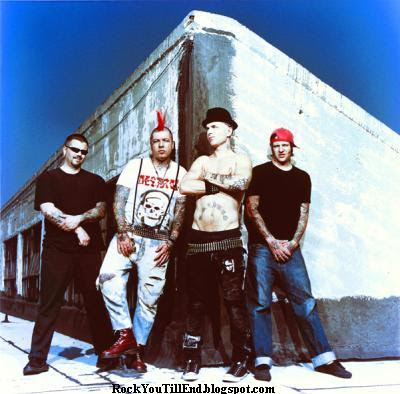This third-generation
punk rock band has stuck to the basics to great success: Keep it short, fast, loud, catchy and simple. Using the Clash as their primary reference point--indeed, many may claim that's putting it very mildly--Rancid has nonetheless come into its own as a potent punk force for a younger generation who don't know the
Clash's Mick Jones from
Foreigner's
Mick Jones.
Rancid Punk Band
Rancid vocalist-guitarist, Tim Armstrong, and bassist,
Matt Freeman, were members of Oakland's ska-punk pioneers Operation Ivy from '87 to '89. Popular in the East Bay (and influential in their own right once
Rancid's fame shed light on them), Op Ivy added punk aggro and speed to ska's rhythm and tunefulness. Forming Rancid in the early '90s, the pair were joined by
drummer Brett Reed, and in '93 signed to the aggressive L.A. punk label Epitaph. Their debut makes good use of Armstrong's Joe Strummer-esque vocalizations and better use of Freeman's extraordinary bass playing.
Rancid's records feature the bass up front shouldering the melody, similar to John Entwistle's function in
the Who. By '94, former U.K. Sub Lars Frederiksen joined as second guitarist-vocalist. Continually improving,
Rancid couldn't have had better timing, for they matured at the precise moment punk caught fire in the mainstream. Following the success of East Bay homeboys
Green Day and
Epitaph labelmates, the Offspring,
Rancid was seen as the band most likely, sparking a bidding war and serious mega-bucks offer from Epic Records. In the eleventh hour of the Epic deal, the band opted to stay indie, securing their punk credibility.

Punk Rock Bands -Rancid
Inspired by corporate rock infringement into punk's private party, Rancid's third album, ...And Out Come The Wolves, busted them wide open. Stars of Lollapalooza and MTV, Rancid still managed to maintain integrity. In '97, Armstrong launched Epitaph subsidiary Hellcat Records, specializing in old-school punk and Two Tone.
With 1998's Life Won't Wait Rancid tipped their collective hat to their ska roots, inviting members of the Specials, the Mighty Mighty Bosstones, and even toaster Buju Banton to join the party.

Rancid Concert
As its title suggests, 2000's Rancid--the band's second self-titled effort--has the group going full throttle back to its punk roots, as evidenced by the collection's 22 songs, which clock in under 40 minutes.
Rather than let their creative impulses tear the band apart, Rancid main men Frederiksen and Armstrong opted to put the band on hold for a few years while they pursued their respective side projects, but in true band-of-brothers fashion, each turned up as a guest on the other's endeavor. Frederickson struck first with Lars Frederiksen & the Bastards, released in 2001 on Armstrong's Hellcat.
Armstrong followed his muse in 2002, forming the Transplants with
Blink 182 drummer
Travis Barker, and former A.F.I. merch salesmen Rob Aston. The trio scored a Modern Rock hit with punk-hip hop hybrid "Diamonds & Guns," which later unbelievably turned up in a commercial for Garnier Fructis Shampoo/Conditioner.

Rancid
Given the success of the Transplants, talk of a Rancid sellout became almost irrelevant, but the band was still concerned about publicizing a new alliance with Warner Bros. Records. Although the band signed a deal with the major for unspecified "additional support," there was no mention of W.B. on 2003's Indestructible. Instead, the album was released under the Hellcat imprint.







No comments:
Post a Comment